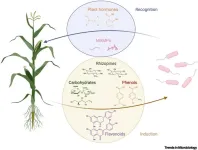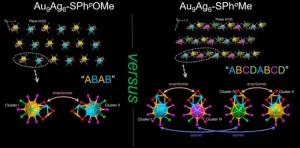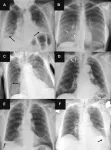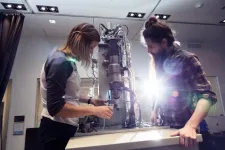(Press-News.org) Leipzig. The decline in invertebrates also affects the functioning of ecosystems, including two critical ecosystem services: aboveground pest control and belowground decomposition of organic material, according to a new study published in Current Biology and led by researchers at the German Centre for Integrative Biodiversity Research (iDiv) and Leipzig University. The study provides evidence that loss of invertebrates leads to a reduction in important ecosystem services and to the decoupling of ecosystem processes, making immediate protection measures necessary.
Invertebrates, such as insects and also other arthropods, snails, slugs and nematodes, represent ~75% of all species described on Earth and are a fundamental part of ecosystems, providing many critical ecosystem functions and services, such as pollination, decomposition, and natural pest control. Human-caused environmental changes, in particular land-use change, landscape simplification, and urbanization, including habitat loss and chemical pollution, have been driving the global decline of invertebrates in recent decades. However, measuring the potential effect of this loss has so far proven difficult. “The manipulation of aboveground invertebrate communities has been a major challenge in ecological research, because of their functional diversity and mobility”, explains Nico Eisenhauer, lead author and professor for Experimental Interaction Ecology at iDiv and Leipzig University.
A team of researchers used the iDiv Ecotron, a joint research platform of iDiv and the Helmholtz Centre for Environmental Research (UFZ). It consists of several controlled mini-ecosystems (so-called EcoUnits), to study the effects of these complex communities. “Apart from offering a bridge between small-scale experiments under highly controlled conditions and less controllable large-scale field experiments or monitoring programs, the goal of the iDiv Ecotron was to enable experiments manipulating biodiversity changes at different levels of food webs in above- and belowground ecosystem compartments”, says iDiv Honorary Member Francois Buscot, professor emeritus at Leipzig University and former head of the UFZ department for Soil Ecology.
The researchers simulated and tested how various ecosystem services and plant diversity respond in 24 distinct grassland ecosystems across three levels of aboveground invertebrate biomass (100%, 36%, and 0%). A biomass level of 36% reflects the dramatic decline of invertebrates reported across German grasslands in the last decade. All plant and invertebrate species were collected from the same adjacent hay meadow, and the researchers simulated the natural turnover of aboveground invertebrate communities by exchanging invertebrate communities three times from May until November 2018. “I am particularly excited about this simulation of the phenology of invertebrate communities - something that has, to my knowledge, not been done before”, Nico Eisenhauer, head of the iDiv Ecotron, adds.
The researchers found that as the biomass of invertebrates decreases, so does the number of ecosystem services. For example, aboveground invertebrates play an important role in natural pest control. The researchers observed that declines in invertebrates went hand in hand with aphid outbreaks indicating that pest outbreaks may be a widespread consequence of biodiversity loss at higher trophic levels, with significant cascading effects on crop production and other ecosystem services.
Further, loss of aboveground invertebrates led to a significant reduction in belowground decomposition. “Aboveground and belowground processes are connected by invertebrates that consume plants and leaf litter. Loss of those connections will change nutrient cycling and how much carbon can be sequestered in ecosystems," explains Ecotron coordinator Dr Jes Hines from iDiv and Leipzig University.
The amount of invertebrate biomass also affected the plants that were growing in the experimental grassland ecosystems. Aboveground plant biomass increased in the EcoUnits with reduced invertebrate biomass. This could be because invertebrates usually eat more of the plant aboveground. “This way, energy is channeled up from plants to higher trophic levels in intact invertebrate communities”, explains Jes Hines. The researchers also found that the concentration of carbon and nitrogen in plant tissue significantly decreased, which, in turn, may alter the quality of resources and nutrients fueling biological activity in soils.
“In a healthy ecosystem, biotic and biogeochemical properties are coupled. This study shows that a decrease in aboveground invertebrate biomass reduces this coupling, which might threaten species diversity, as well as animal, plant, and microbial nutrition”, says Nico Eisenhauer. Despite these alarming findings, ecosystems may recover following legislative changes that favor invertebrate diversity. For example, there is evidence of freshwater insect populations increasing following the Clean Water Act. Immediate protection measures stand to turn the tide on safeguarding diverse invertebrate communities and important ecosystem functions.
END
Invertebrate decline reduces natural pest control and decomposition of organic matter
Immediate protection measures are required to safeguard invertebrate communities and critical ecosystem services.
2023-09-26
ELSE PRESS RELEASES FROM THIS DATE:
Genetically engineering associations between plants and nitrogen-fixing microbes could lessen dependence on synthetic fertilizer
2023-09-26
Nitrogen is an essential nutrient for plant growth, but the overuse of synthetic nitrogen fertilizers in agriculture is not sustainable. In a review article publishing in the journal Trends in Microbiology on September 26, a team of bacteriologists and plant scientists discuss the possibility of using genetic engineering to facilitate mutualistic relationships between plants and nitrogen-fixing microbes called “diazotrophs.” These engineered associations would help crops acquire nitrogen from the air by mimicking the mutualisms between legumes and nitrogen-fixing bacteria.
“Engineering associative diazotrophs to provide nitrogen ...
Impact of parental relatedness on type 2 diabetes and other common diseases uncovered
2023-09-26
A new study finds that consanguinity – unions between close relatives - may increase the risk of common diseases such as type 2 diabetes and post-traumatic stress disorder (PTSD).
Researchers from the Wellcome Sanger Institute and their collaborators at Queen Mary University of London analysed the genomic data of diverse groups to investigate the relationship between autozygosity - a measure of genetic relatedness between an individual’s parents - and the prevalence of common diseases, with a novel method that reduces confounding due to sociocultural factors. They focused ...
Redefining global health security: A novel framework sheds light on equity and decolonial approaches
2023-09-26
Redefining Global Health Security: A Novel Framework Sheds Light on Equity and Decolonial Approaches
Kuala Lumpur, Malaysia and London, UK – 25 September 2023
In the wake of the COVID-19 pandemic, a new policy paper titled "Global Health Security and the Health-Security Nexus: Principles, Politics and Praxis" in the journal BMJ Global Health, warns of dangers and potential pitfalls associated with the increased attention paid to ‘global health security’ and the growing interaction between public health and security actors.
According to the authors, the prevailing ...
Inbreeding can be beneficial in the long run
2023-09-26
"Of all the subspecies of reindeer found in the high north, the Svalbard reindeer has the most inbreeding and the lowest genetic diversity," says Nicolas Dussex, a postdoc at Norwegian University of Science and Technology´s (NTNU) Department of Natural History.
It was only 7000-8000 years ago that the first reindeer migrated to Svalbard, most likely from Russia via Novaya Zemlya and the islands of Franz Josef Land. Perhaps there were no more than a few animals that established themselves on the arctic ...
Feds fund research that could slash US cancer deaths by 50%
2023-09-26
HOUSTON – (Sept. 26, 2023) – The Advanced Research Projects Agency for Health (ARPA-H) has awarded $45 million to rapidly develop sense-and-respond implant technology that could slash U.S. cancer-related deaths by more than 50%.
The award to a Rice University-led team of researchers from seven states will fast-track development and testing of a new approach to cancer treatment that aims to dramatically improve immunotherapy outcomes for patients with ovarian, pancreatic and other difficult-to-treat cancers.
“Instead of tethering patients to hospital beds, IV bags and external monitors, ...
Thiol ligands modify metal nanocluster structures and optical properties
2023-09-26
Metal nanoclusters are tiny, crystalline structures up to two nanometers (2 x 10-9 meters) in diameter that contain a few to hundreds of metal atoms. Understanding the precise assembly of metal nanoclusters is paramount to determining how different structures affect the properties and molecular interactions of these materials. Researchers recently synthesized two similar gold-silver (Au9Ag6) nanoclusters in a highly controlled manner to determine the precise atomic structure of each nanocluster and the effects of specific thiol ligands, or sulfur-containing binding molecules, on material synthesis.
Given their extremely small size, metal nanoclusters have ...
Researchers build and test a framework for achieving climate resilience across diverse fisheries
2023-09-26
(Santa Barbara, Calif.) — What makes for a successful climate-resilient fishery, one that sustainably produces resources for human benefit despite increasing climate stressors and human impacts? It’s a question that faces present and future fisheries, their practitioners and fishing communities as the world turns to the ocean to feed its growing population.
“For a fishery to be resilient it needs to be able to prepare for, resist, cope with, recover from, or adapt to any given impact,” said Jacob Eurich, who is a research associate at UC Santa Barbara’s Marine Science Institute, and a fisheries scientist at the Environmental Defense Fund (EDF). “In ...
Radiologists outperformed AI in identifying lung diseases on chest X-ray
2023-09-26
OAK BROOK, Ill. – In a study of more than 2,000 chest X-rays, radiologists outperformed AI in accurately identifying the presence and absence of three common lung diseases, according to a study published in Radiology, a journal of the Radiological Society of North America (RSNA).
“Chest radiography is a common diagnostic tool, but significant training and experience is required to interpret exams correctly,” said lead researcher Louis L. Plesner, M.D., resident radiologist and Ph.D. fellow in the Department of Radiology at Herlev and Gentofte Hospital in Copenhagen, Denmark.
While commercially available ...
SwRI, UTSA collaborate to detect traumatic brain injury through breath analysis
2023-09-26
SAN ANTONIO — September 26, 2023—Researchers from Southwest Research Institute (SwRI) and The University of Texas at San Antonio (UTSA) are developing techniques to detect traumatic brain injury (TBI) by analyzing breath for specific biomarkers. The project, led by SwRI’s Dr. Mark Libardoni and UTSA’s Dr. Marzieh Memar and Dr. Morteza Seidi, is supported by a $125,000 grant from the Connecting through Research Partnerships (Connect) program.
Breath analysis is performed by analyzing exhaled breath for specific biomarkers, such as metabolites, proteins and ...
Projects launch to map brain connections in mouse and macaque
2023-09-26
A complete map of all the connections in an entire mammalian brain may be in sight. Allen Institute researchers have just launched three new projects to construct large, detailed maps of neuronal connections in sections of the mouse and macaque brains, with an eye toward creating full wiring diagrams of these animals’ brains in the future. These projects are funded by the National Institutes of Health’s Brain Research Through Advancing Innovative Neurotechnologies® (BRAIN) Initiative.
Allen Institute research teams ...
LAST 30 PRESS RELEASES:
Low-intensity treadmill exercise preconditioning mitigates post-stroke injury in mouse models
How moss helped solve a grave-robbing mystery
How much sleep do teens get? Six-seven hours.
Patients regain weight rapidly after stopping weight loss drugs – but still keep off a quarter of weight lost
GLP-1 diabetes drugs linked to reduced risk of addiction and substance-related death
Councils face industry legal threats for campaigns warning against wood burning stoves
GLP-1 medications get at the heart of addiction: study
Global trauma study highlights shared learning as interest in whole blood resurges
Almost a third of Gen Z men agree a wife should obey her husband
Trapping light on thermal photodetectors shatters speed records
New review highlights the future of tubular solid oxide fuel cells for clean energy systems
Pig farm ammonia pollution may indirectly accelerate climate warming, new study finds
Modified biochar helps compost retain nitrogen and build richer soil organic matter
First gene regulation clinical trials for epilepsy show promising results
Life-changing drug identified for children with rare epilepsy
Husker researchers collaborate to explore fear of spiders
Mayo Clinic researchers discover hidden brain map that may improve epilepsy care
NYCST announces Round 2 Awards for space technology projects
How the Dobbs decision and abortion restrictions changed where medical students apply to residency programs
Microwave frying can help lower oil content for healthier French fries
In MS, wearable sensors may help identify people at risk of worsening disability
Study: Football associated with nearly one in five brain injuries in youth sports
Machine-learning immune-system analysis study may hold clues to personalized medicine
A promising potential therapeutic strategy for Rett syndrome
How time changes impact public sentiment in the U.S.
Analysis of charred food in pot reveals that prehistoric Europeans had surprisingly complex cuisines
As a whole, LGB+ workers in the NHS do not experience pay gaps compared to their heterosexual colleagues
How cocaine rewires the brain to drive relapse
Mosquito monitoring through sound - implications for AI species recognition
UCLA researchers engineer CAR-T cells to target hard-to-treat solid tumors
[Press-News.org] Invertebrate decline reduces natural pest control and decomposition of organic matterImmediate protection measures are required to safeguard invertebrate communities and critical ecosystem services.









